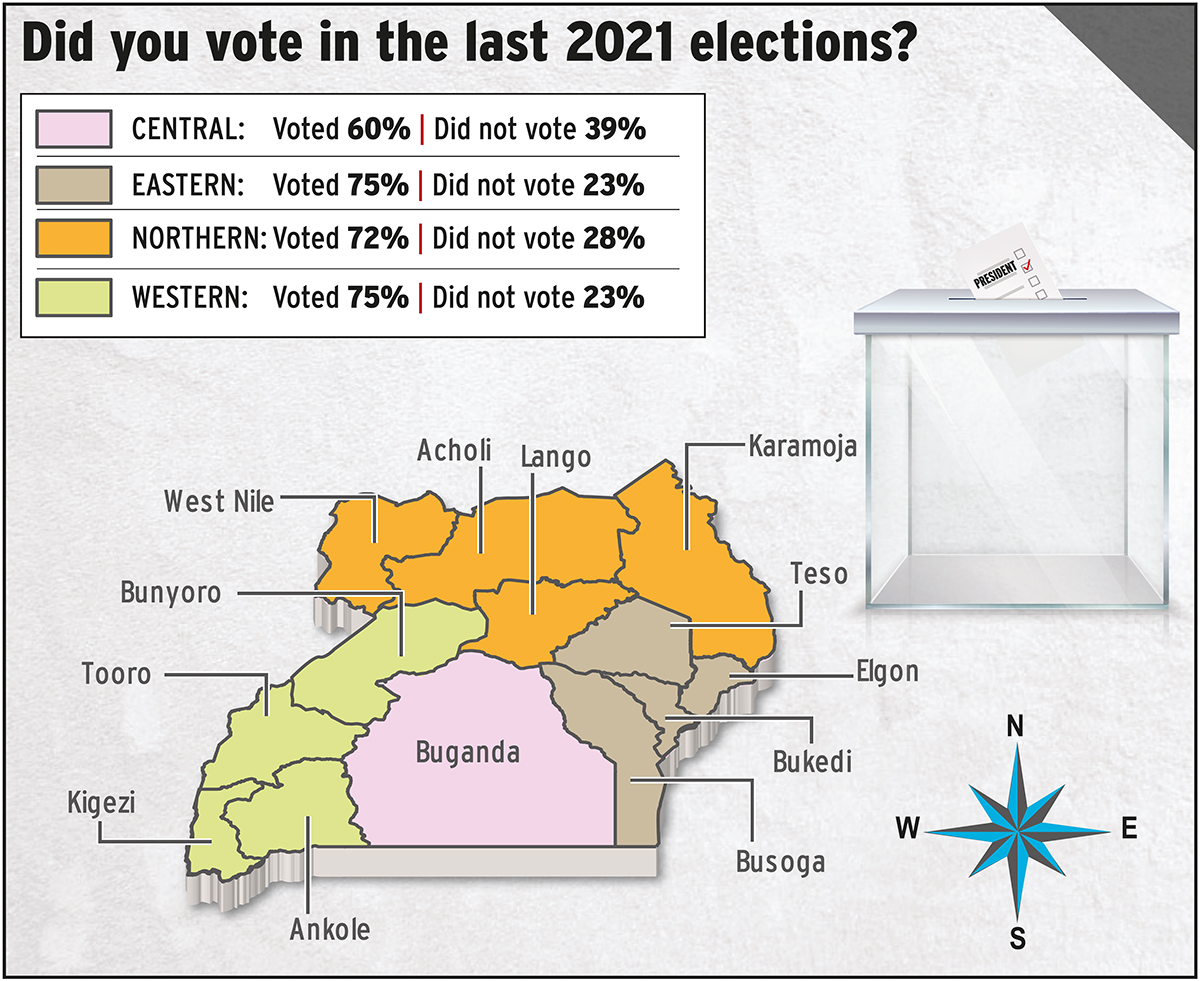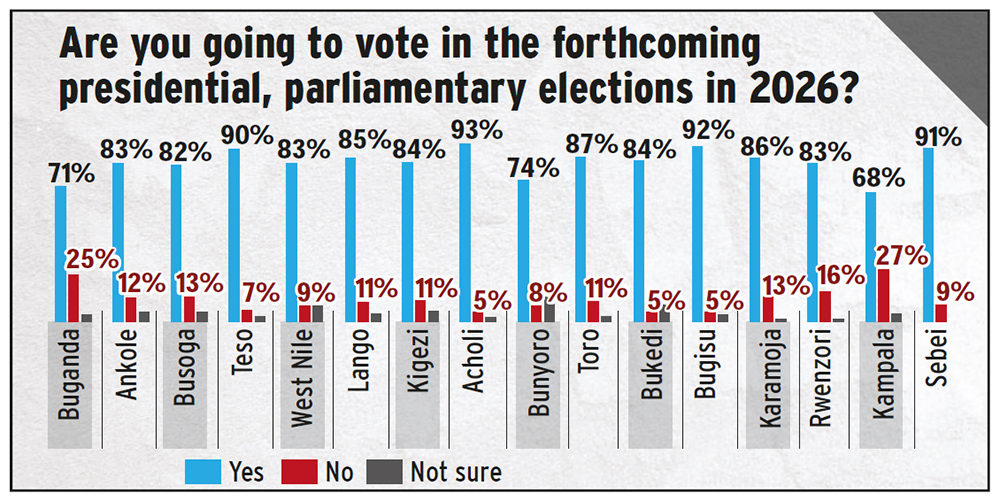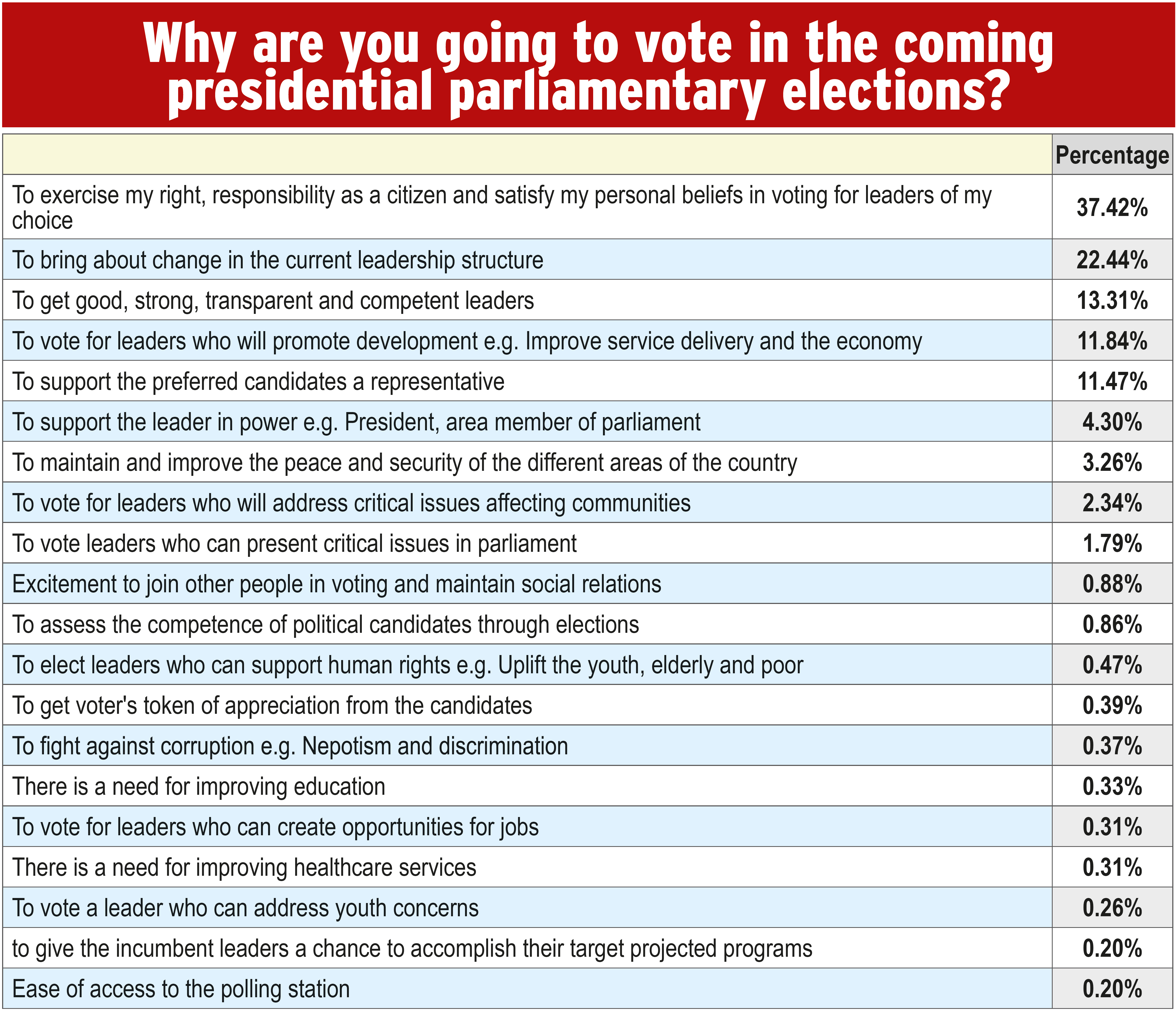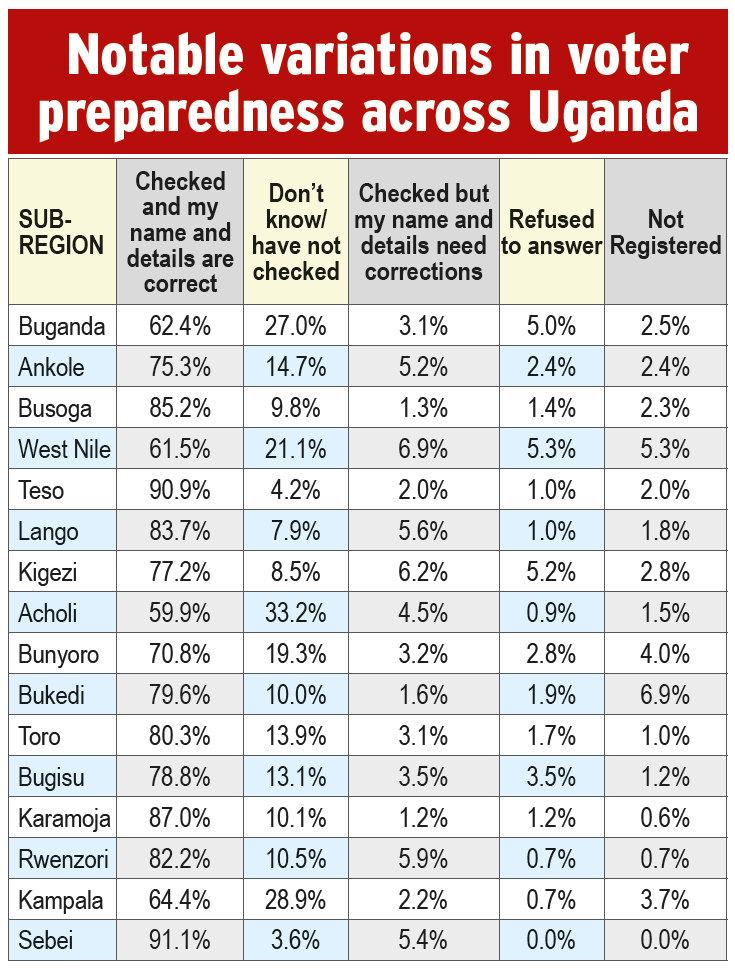How ready are Ugandans for the coming elections?
Kampala and Buganda also have the highest percentage of people who said they will not vote, at 27% and 25% respectively.
How ready are Ugandans for the coming elections?
By Nelson Kiva
Journalists @New Vision
KAMPALA - If elections were held today, the central region would register the lowest turnout compared to other regions in the country. While over 80% of the respondents in other regions say they will vote, in central, only 71% of the respondents said they would vote.
In the 2021 general election, the voter turnout was only 52%.
Kampala and Buganda also have the highest percentage of people who said they will not vote, at 27% and 25% respectively.
Inside Vision Group poll
The Vision Group research team conducted an opinion poll between March and May this year, covering 6,006 Ugandans across 45 districts and all 17 sub-regions. It was conducted to assess the public’s perception of the forthcoming general election.
The survey, which targeted citizens aged 18 and above with valid national identification cards, shows that more Ugandans will participate in next year’s general election.
The poll revealed that eastern and northern regions had the highest levels of voters eager to vote next year, with 87% of the respondents in each region indicating they plan to vote.
Did you vote in the last 2021 elections
The western region follows closely at 81%, with the central region following behind with 71%.
At least 4,924 (82%) of the respondents expressed their intention to vote in next year’s presidential and parliamentary elections, against 780 (13%) who said they would not vote.
The poll included rigorous engagement of respondents, transparent processes and robust data collection methods to generate reliable and representative insights.
The poll experts said the large number of people confirming willingness to vote suggests strong public interest and engagement in the electoral process.
The 13% who do not intend to vote next year, according to the study, may reflect concerns such as voter apathy, mistrust in the system or other barriers to participation, which may require further investigation.
The Electoral Commission (EC) said they have done all that is necessary to empower every voter to exercise his or her democratic right in electing leaders of their choice in the next elections.
“We compiled the voters’ register to ascertain who the voters are, and we are really doing our best to empower them to vote. We are doing this through massive civic voter education to purposely answer the question of why it matters to vote,” EC spokesperson Julius Mucunguzi said.
Voter empowerment, Mucunguzi said, is a continuous exercise being conducted by the staff of the commission using media and other means, including outreaches in schools, youth groups and markets.
Readiness by region
The poll revealed that eastern and northern regions had the highest levels of voters eager to vote next year, with 87% of the respondents in each region saying they plan to vote.
The Western region follows closely at 81%. However, the central region lags behind, with 71% intending to vote.
The researchers said the analysis of the poll showed that the central region may require targeted voter mobilisation and engagement efforts to address potential barriers to participation and boost electoral involvement.
The sub-regional data on voter intentions for next year’s elections shows generally high anticipated participation, with most sub-regions reporting over 80% of respondents saying they plan to vote.
For example, Acholi (93%), Bugisu (92%) and Sebei (91%) stand out with the highest levels of expected voter turnout, while Kampala (68%) and Buganda (71%) show the lowest.

Respondents on why they are going to vote next year
About 37.42% of the respondents disclosed plans to vote to exercise their civic duty and express personal beliefs in selecting leaders of their choice.
Over 22.4% of the respondents said they were motivated by the desire to bring about change in the current leadership, while 13.31% seek to elect competent and transparent leaders.
Others said they wanted to promote development and service delivery (11.84%), and 11.47% of the respondents planned to vote for their preferred candidates.
There are those who said their target is to vote for incumbents, and they constituted 4.30,% and those who plan to vote in order to maintain peace and security are 3.26%.
Those targeting to vote for leaders who will address critical community issues are 2.34%.
A few other respondents cited reasons such as social participation, human rights, youth and women empowerment, fighting corruption and sector-specific improvements (education, health, agriculture, transport).
Sarah Birete, the executive director of the Centre for Constitutional Governance, said going forward, the EC must boost voter education, saying what they have done so far is not yet enough to encourage voters to participate in next year’s polls.
“There has not been sufficient voter education. “The little that we are seeing is scattered posters in town by the Electoral Commission, not everybody comes to town. The majority of the voters are in the rural areas. There is a need for massive sensitisation of the people about their rights and duties in elections, about the role of the other actors and also about peaceful elections,” Birete said.
The low turnout in last week’s youth election, Birete said, should not be let pass, but act as a tipping point of what may take place next year.
Voter-ability status
The study, in particular, defines “voter-ability status” as the readiness or eligibility of individuals to vote, based on whether they had verified their voter registration details in readiness for elections in 2026.
The poll, in its snapshot of the voter preparedness, shows that 73% of respondents (4,396 people) checked their registration details and confirmed they were correct.
“A high percentage of people who have checked and verified their information suggests strong electoral engagement. Sixteen per cent (968 people) did not check or don’t know whether they are correctly registered.”
However, the 16% who have not checked and the 4% who found errors, the study shows, highlight the need for further voter education and support to ensure full participation.
The EC conducted the exercise for the display of the national voters’ register from April 25 to May 15, meaning those with uncorrected inconsistencies in their biodata are likely to miss out on voting.

Strong voter readiness
In the breakdown of sub-regions, Sebei (91.1%), Teso (90.5%), Karamoja (86.5%), and Busoga (84.1%) have the highest proportions of respondents who have checked and confirmed their voter registration details, indicating strong voter readiness.
In contrast, Acholi (59.9%), Bunyoro (59.7%) and West Nile (60.9%) show lower verification rates and higher levels of uncertainty or inaction, with Acholi particularly standing out for its high share of respondents who have not checked (33.2%).
The central region also has the highest proportion of people who have not checked or are unsure of their registration status (27%), suggesting a gap in voter engagement or awareness, the poll report says.
It added that northern and western regions had a slightly higher proportion (5%) of individuals whose registration details needed correction.
The poll further highlights that across all regions, the proportion of those not registered to vote is consistently low (2-3%), indicating generally good voter registration coverage.
Key statistics to note from the poll are that 4% (219) of the people who checked their details during the display of the voters’ register found errors in their registration details, which could affect their ability to vote.
The 4% (268 people) declined to answer the question.
“We had a period for the display of the voters’ register for people to check their particulars and to correct any mistakes in case of any. So, after the display, no new details can be entertained or accommodated in any way,” Mucunguzi said.
A total of 155 (3%) respondents were found not to be registered voters. The highest proportion of individuals not registered to vote is in Bukedi (6.8%) and West Nile (5.2%).
Experts say these regional disparities suggest the need for targeted voter education and registration initiatives, especially in sub-regions with lower verification and higher uncertainty, to enhance electoral participation.
NRM preparing supporters
Rosemary Sseninde, the director for mobilisation of the National Resistance Movement (NRM), said as a party, they are rallying their supporters to ensure that they renew their national identity cards so that they do not miss out on voting.
“I would like to appeal to our people: if they have to vote for their party in 2026, they must make sure that they have their IDs renewed. We do not want to hear excuses that they did not vote because of lacking IDs,” Sseninde said.
“If you don’t go to vote, and you give any kind of excuse that prevents you from going to vote, then you have abused the democracy that this Government put in place. The Constitution gave you that freedom to vote,” she said.
Swaibu Kaggwa Nsereko, the spokesperson of the Justice Forum party, encouraged the EC to scale up its vigilance.
“We particularly draw attention to the recent youth elections. The EC did not do enough to ensure that youth in schools exercise their right of electing their representatives at the various levels. It’s the EC that should have asked the Government to make the election day a holiday for students to participate,” Nsereko said.
He said: “The EC had to take steps to ensure provision of polling stations within accessible distance to students too, because the majority of youth are in schools. Failure of this disenfranchised a significant number of youth from exercising their right, and this enormously affected the poll outcome.”

Voting in the 2021 elections
On the question of whether they voted in the last general election in 2021, 71.2% (4,274 individuals) responded ‘yes’ while 1,652 (27.5%) reported not to have voted.
Further analysis of the 2021 voting pattern showed that more voters in the rural areas exercised their electoral rights (73%) compared to the urban areas (68%).
Question on why they voted in the 2021 elections
In rural areas, it was only 25% who said they did not vote, while 2% objected to answering the question.
In urban areas, 37% of the respondents confirmed not having voted in the 2021 elections, as 1% of the respondents avoided responding to the question.
According to the study, the incidence of finding people who voted in 2021 was highest in the western and eastern regions (75%). Northern had 72%, and the lowest was central with 60%.
The 2021 elections were impacted by COVID-19, which ravaged the country, and campaigns were conducted under an array of stringent anti-COVID protocols.
The age factor
In terms of age, voters between the ages of 18 and 24 (2%) voted least in the election. The 8% of the voters in the particular age bracket did not vote.
However, across age groups, the majority of those who voted were in the 25-39 age range.
About 12.2% of the youth in the age bracket of 25-29 voted, while 7.6% of them did not vote, according to the analysis.
Most people who voted, according to the analysis, were aged 30-34 (13%), though 4.4% of them did not vote.
Last year’s national population census showed that over 70% of Uganda’s population is below the age of 30, with 22.7% specifically aged between 18 and 30.
About 48.21% of the population is children aged between 0-14 (not involved in voting).
Reasons for not voting
On the question of “Why did you not vote in the last elections held in 2021?”, the respondents listed several reasons that ranged from political, logistical, to social.
However, the most common reason for not voting across all regions was ineligibility due to the lack of a national ID.
This particularly affected voters from the northern region (32.9%) and was equally high in the central and eastern regions (22.8%).
On the national average, 24% of those who did not vote, according to the poll, did not have IDs.
There was voter disengagement due to a lack of interest in politics, especially in the central region (18.3%), followed by lower but still notable levels in other regions.
The study also discovered that absence from the constituency during the election period also prevented many from voting, especially in the eastern (15.3%) and western (13.2%) regions.
Other issues mentioned for not voting were age-related ineligibility, illness and failure to register.
Western (11.6%) and eastern (11%) regions recorded the highest percentages of unregistered voters.
A smaller but significant portion of respondents cited disillusionment with the political process of governance.
NUP frustrated
Benjamin Katana, the National Unity Platform (NUP) treasurer, said their activities to mobilise voters and to prepare for the next elections were being frustrated by “the NRM, which runs the country as a one-party state”.
He said: “For instance, we have written to EC and Police informing them that we are going to consult for the presidential aspirant, it is now about three months, and they have not responded. Even in Kampala, our activities are restricted to the party headquarters.”